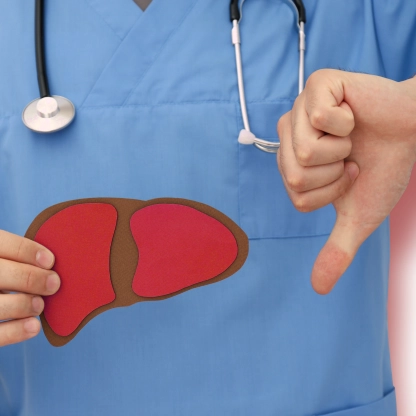
Article summary
Topic
Viral hepatitis is a liver disease caused by viruses. There are 6 currently known viruses that causes this disease, three of which are most commonly encountered in Poland: hepatitis A virus, hepatitis B virus and hepatitis C virus.1
Alchohol remains a serious problem causing significant damage to this organ
How can HBV and HCV infection be contracted?
Hepatitis B and hepatitis C infection can be contracted by contact with blood or secretions (saliva, sperm, vaginal secretions) of an infected person.
Therefore, the infection can be contracted:
What are the symptoms of viral hepatitis?
For a long time, an infection with hepatitis viruses is not associated with any symptoms that would be noticed by the patient and that would allow an early diagnosis. Hepatitis B virus may not give any symptoms even for 6 months after the infection; for hepatitis C virus it is even a few years. Both HBV and HCV give unspecific symptoms at an early stage. They may include:
Accelerate liver regeneration with Phospholipids (Essentiale® Forte P)
How is viral hepatitis diagnosed?1
An infection with HBV or HCV is diagnosed through a general interview with the patient as well as laboratory tests and imaging examinations, which help assess changes that have occurred in the body as a result of viral activity. Additionally, in patients with an enlarged liver, biopsy is performed, which means taking a sample of liver cells for examination.2, 5
How is viral hepatitis treated?1
Treatment of viral hepatitis consists in taking antiviral medicines and medicines that will relieve the burdensome symptoms. Such medicines can only be prescribed by a doctor. In addition to the above, the following should be ensured:
How to prevent viral hepatitis B and C?
The most effective form of preventing the infection is undergoing prophylactic vaccination. Owing to the introduction of prophylactic vaccination against viral hepatitis B, mandatory for all newborns and adolescents, the incidence of this disease has been significantly reduced in Poland. However, no vaccine against hepatitis C virus has been developed so far.1
Measures to reduce the risk of infection include keeping high hygiene standards, avoidance of sharing personal objects such as a toothbrush with other people, selecting beauty and tattoo parlours with high hygiene standards, using mechanical protection during sex.5
FAQ
- by HBV within a range of 2-10%,
- by HCV within a range of 55-75%.1
Acute viral hepatitis B or C can develop into chronic hepatitis and progress to cirrhosis.1
The chance for a complete cure depends on the cause of acute viral hepatitis. HAV does not cause chronic inflammation. In contrast, it can be caused by HBV and HCV infections:
According to WHO, in 2015 approximately 71 million people suffered from a chronic infection with hepatitis C virus, while more than 1.2 million people were living with chronic infection with hepatitis B virus.
Also in 2015, 399,000 deaths were attributed to hepatitis C and 887,000 deaths were attributed to hepatitis B – mainly due to hepatic cirrhosis and hepatocellular carcinoma (i.e. primary liver cancer).3
- Juszczyk J. Ostre wirusowe zapalenie wątroby (WZW), Medycyna Praktyczna, Gastrologia http://gastrologia.mp.pl/choroby/watroba/50949,ostre-wirusowe-zapalenie-watroby-wzw. accessed on: 10/03/2021
- MedLine Plus Medical Encyclopedia. Topic: Hepatitis B.; https://medlineplus.gov/hepatitisb.html accessed on: 08/03/2021
- WHO Hepatitis C fact sheet https://www.who.int/news-room/fact-sheets/detail/hepatitis-c accessed on: 17/03/2021
- Wnuk A. Wirusy hepatotropowe a zakażenie HIV, Borgis - Postępy Nauk Medycznych 3/2004, pp. 18-25
- MedLine Plus Medical Encyclopedia. Topic: Hepatitis C.; https://medlineplus.gov/hepatitisc.html accessed on: 11/02/2021
%20(1)%20(1).webp)

